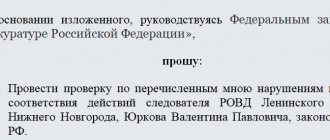During the judicial investigation, violations are often observed, expressed in deliberate non-compliance with the norms of professional regulations on the part of an employee of the Investigative Committee, the central figure of which is the investigator. Taking into account the role of this employee, as well as the consequences of the decisions he makes, if illegal elements are detected in his activities, this should be immediately reported by filing a complaint in the prescribed form.
In this article we will tell you how to file a complaint against the actions of an investigator, where it should be sent and what consequences to expect if it is filed.
Multi-channel free hotline Legal advice on criminal law. Every day from 9.00 to 21.00
Moscow and region: +7 (495) 662-44-36
St. Petersburg: +7 (812) 449-43-40
Grounds for appeal
A complaint against an investigator is subject to consideration if there are compelling reasons, which may include any offenses committed by an employee of the Investigative Body. The illegal actions of the investigator, which can be legally appealed by filing an appropriate application (complaint), include the following:
- Unreasonable refusal to open criminal proceedings;
- Deliberate inhibition of the investigative process;
- Unjustified closure of criminal proceedings;
- Subjective (rather than objective) assessment of the information provided, distortion of available evidence, “judgment” of one side of the case;
- Extortion of a bribe, threats, psychological pressure and other actions of an illegal nature taken in relation to one of the parties to the paperwork.
As practice shows, quite often, completely legal and justified actions of an investigator are interpreted by citizens as infringing and violating their rights and interests. For example: delay in the process of initiating a criminal case can play into the hands of criminals, allowing them to hide evidence or even leave the country. However, in some cases, in order to begin proceedings, it is necessary to obtain appropriate confirmation and evidence - otherwise the arrest will be considered illegal and the initiation of criminal proceedings will be groundless.
Finding such grounds often requires a lot of time and resources, therefore, before filing a complaint against an investigator, you should make sure that his activities really contradict the norms of the current legislation of the Russian Federation.
Institutions of appeal
Having made sure that the actions of the investigator really contradict the norms of domestic legislation, you can proceed to drawing up a complaint. But before we tell you how to do this, you should first find out where to file a complaint.
Below are the main authorities in which you can appeal against the unlawful actions of an Investigative Committee employee by filing a complaint.
Head of the investigative institution
In order to speed up the processing of the complaint as much as possible, it should be submitted to the immediate superior of the investigator who violated the law. In this case, the response time to the filed complaint will be no more than 3 days from the moment it is received by the investigative authorities.
In some cases, the consideration period may be somewhat delayed, but in this case the reasons for the delay will be explained.
In most cases, the leadership of the Investigative Committee provides a response to received requests from citizens as soon as possible, since they are interested in ensuring that the “news” about the incompetence of its subordinates does not spread to higher authorities.
Central office of the investigative body
If the situation cannot be resolved at the stage of contacting management, the next step will be filing a complaint with the central office of the Investigative Authority. This method of appealing against unlawful actions of an investigator is one of the most convenient, since it can be carried out directly online.
Today, you can file a complaint with this authority in one of the following ways:
- By sending a registered letter by Russian Post. Address: Moscow per. Technical 2;
- Using the hotline: 8-800-10-01-260;
- By leaving an online complaint at the Internet reception desk on the official portal of the Insurance Company (sledcom.ru).
Before filing a complaint, you should check several times whether the actions taken by the investigator actually fall under the category of “illegal.”
Prosecutor's office
Non-illegal actions or fact of inaction on the part of the investigator can be complained to one of the central government bodies exercising a supervisory function - the prosecutor's office. Currently, you can file a complaint with this authority in the following ways:
- Personal visit to the selected unit of the supervisory authority. It may be a branch of the District, City, Regional or General Prosecutor's Office. It is considered the fastest option for filing a claim against an Investigative Committee employee. It should be borne in mind that when compiling this method, you will need an identification document (passport);
- By means of a power of attorney (through a proxy). When using this appeal method, you should keep in mind that the document that will guide the authorized person when contacting a law enforcement agency must be certified by a notary;
- By post (registered mail with notification of acceptance). It is considered the “slowest” method of filing a complaint, which should be resorted to only if filing one of the above is impossible.
Court
Unlawful actions of the investigator can also be challenged in court. It is allowed to file a complaint against an investigator in court only at the place where criminal proceedings are being considered. Once the complaint is registered, it will be reviewed within the next five days.
Upon review by employees of the state court, one of the following decisions will be made:
- Satisfaction of the complaint with the subsequent recognition of specific actions of the investigator as illegal and his bringing to disciplinary or criminal liability;
- Refusal to satisfy the complaint due to the lack of proper grounds for this.
General list of investigator powers
Article 38 of the Code of Criminal Procedure describes the following basic rights and responsibilities of the investigator:
- to initiate criminal proceedings;
- accept it for your proceedings or transfer it to the head of the investigative department;
- select versions of the crime for further development;
- make a decision to conduct investigative actions and send requests for their conduct to the prosecutor’s office or court, if required by law (for example, a search of a residential premises);
- issue instructions to operational units, local inspectors, and investigative bodies to carry out operational activities or investigative actions;
- appeal the decisions of the prosecutor with the permission of the head of the investigation;
- express your disagreement with the prosecutor's comments.
The investigator’s right to appeal the prosecutor’s decisions is limited and applies only to:
- cancellation of the decision to initiate proceedings;
- return of materials to the investigator for additional investigation;
- change in qualifications (which articles of the Criminal Code should be applied);
- change in the scope of the charge (number of episodes of crime);
- drawing up a new indictment or eliminating other deficiencies.
The complaint is submitted to a higher prosecutor, up to the General Prosecutor's Office.
The implementation of these and other rights and obligations of the investigator is carefully described in the section of the Code of Criminal Procedure devoted to the preliminary investigation.
Drawing up a complaint
The speed and success of its consideration and satisfaction of the applicant’s demands depends on how correctly and correctly the complaint is drawn up.
Despite the absence of a legally established form for this document, when drawing it up, certain structural and content features should be adhered to. So, when drawing up a complaint against an investigator, you should make sure that it contains the following information:
- Full and exact name of the authority to which the application will be submitted;
- Details of the applicant (last name, first name, patronymic, residential address, contact phone number);
- A detailed and chronological statement of the essence of filing an application, legislative support for the violations voiced;
- A list of documentation confirming the applicant’s words voiced in the main part of the application, in other words, the available evidence base;
- Date of application, personal signature of the applicant.
If a complaint is submitted through a proxy, it must include the details of that person. In addition, a notarized photocopy must be attached to the main application.
When filling out the application, you should adhere to a business style; you should also make sure that the text of the document does not contain obscene language, abbreviations, abbreviations, foreign words, stylistic, grammatical and other types of errors.
Sample
Sample complaint against the actions of an investigator.doc
Submission methods
A completed complaint can be submitted in one of the following ways:
- During personal appearance at the selected government agency. In this case, the application itself is submitted to the office of the authority, where it is then registered and sent for consideration to its authorized employee;
- By post. Having chosen this method, you should send the application by registered mail with a list of attachments and notification of acceptance;
- Online. Today, you can file a complaint online when contacting almost any government agency. To do this, you need to go to the official website of the selected authority, and then leave your appeal using the Internet reception.
Terms and procedure for consideration
After the received application is registered, an authorized employee of the supervisory authority will subject it to a thorough analysis. According to the law, the standard period for considering a complaint should not exceed 3 days; in some cases, if there is a large list of additional materials, this period can last up to 5 days.
In exceptional cases, the period for consideration of the application may be delayed even further, but in this case the applicant will receive a corresponding notification.
The result of consideration of the application will be one of the following decisions:
- Satisfaction of the complaint and requirements thereunder;
- Refusal to satisfy the application and return of the application to the citizen who submitted it.
What is meant by inaction?
Illegal inaction of an investigator means refusal or evasion of work that he is obliged to do by virtue of the law. Illegal actions also mean going beyond the scope of authority or carrying them out in violation of procedural law.
Violations are considered significant and entail sanctions from the prosecutor or head of the investigative department if they lead to infringement of the rights of citizens or affect the effectiveness of the investigation. However, the last points are closely related.
Examples of inaction:
- refusal to initiate a case;
- refusal to apply measures aimed at securing a civil claim and preserving property that was obtained by criminal means.
- refusal to call a witness or demand evidence that confirms the words of the accused;
- refusal to order an examination;
- unjustified avoidance of investigative action, adoption of a different procedural decision.
The law gives reason to believe that inaction takes absolutely any form, and the author of the complaint is not limited in how to formulate his demands.
The legislative framework
When drawing up a statement and indicating in it legal references confirming the accusations against the investigator, you should be guided by the following legislative norms:
- Federal Law “On the procedure for considering appeals from citizens of the Russian Federation” dated May 2, 2006 No. 59;
- Article 125 Criminal Procedure Code of the Russian Federation;
- Order of the Investigative Committee under the Prosecutor's Office of the Russian Federation dated September 19, 2007 No. 17 (as amended on April 8, 2008). “On the introduction into force of the Instruction on the procedure for considering applications and receiving citizens in the system of the Investigative Committee under the Prosecutor’s Office of the Russian Federation.”
Indication of these legislative norms in the statement of claim against the investigator will significantly reduce the likelihood of refusal to satisfy her requirements and return the document itself to the applicant.
Who is an investigator?
Investigator - an official of a police agency, investigative committee or FSB. Its task is to investigate crimes, that is, to form an evidence base for prosecution in court.
Despite differences in departmental affiliation, the procedural status of investigators is the same.
According to the law, an investigator is a participant in the process who belongs to the prosecution. Despite this, it obliges him to be objective and collect evidence in favor of the accused. This contradiction leads to the fact that citizens remain defenseless against abuses by officials. The lawyer is quite limited in his capabilities.
The only thing left is to write a complaint about the investigator’s inaction or his actions that violate the law.










